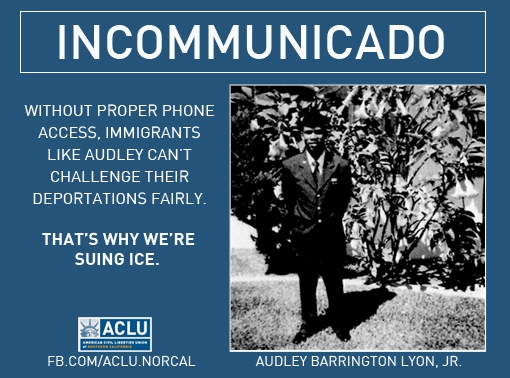No Phone Calls, No Justice
Page Media

Audley Barrington Lyon, Jr. is currently in immigration detention while he fights deportation to Jamaica. A “U visa” is a beacon of hope for Mr. Lyon, who was an innocent bystander when he was seriously injured in shooting. A U visa—available to crime victims who cooperate with criminal investigations—would give him the opportunity to stay in the country with his U.S. citizen wife. Unfortunately, he doesn’t stand a fighting chance.
The phone system in immigration detention will not allow him to call the police to request the certification of his cooperation, a requirement he must fulfill in order to submit his visa application.
The facility where Mr. Lyon is held doesn’t allow detainees to purchase calling cards, and most government offices don’t accept collect calls. Mr. Lyon can’t afford a lawyer and is relying on his wife for help. But, calls from detention are so expensive that they are forced to coordinate by mail, which is impossibly slow. And, Mrs. Lyon cannot obtain the U visa certification for her husband because the police will only release the required information directly to crime victims or their legal representatives.
Though isolated, Mr. Lyon is not alone. He is standing up for a class of hundreds of detained immigrants who face similar restrictions on their telephone access, restrictions that violate their rights by making it next-to-impossible for them to consult with or hire a lawyer, or represent themselves in these life-changing deportation cases.
In all of northern California’s immigration detention facilities, detainees can’t reach an office with an automated greeting or even record a voicemail because calls can only be completed if someone answers the phone and accepts the call. For many immigrants, calls are allowed at inconsistent times, often outside of regular business hours. There is also no way for a detainee to receive calls or for lawyers to schedule calls with their clients. Telephones are in the common areas, eliminating any possibility of privacy when detainees make legal calls about sensitive topics. Calls are also far too expensive for many families to afford. In one of the facilities, an in-state, long-distance call costs $3.00 to connect plus $0.25 per minute—$6.75 for a 15-minute call. Calls cut off automatically after 15 minutes.
The ACLU of Northern California and Orrick, Herrington & Sutcliffe LLP have filed a class action lawsuit against the Immigration and Customs Enforcement agency (ICE), because it’s time to uphold everyone’s dues process rights as they fight for the opportunity to live and work in the United States and to avoid permanent separation from their families.
Julia Mass is a staff attorney with the ACLU of Northern California and Jenny Zhao is the Liman Public Interest Fellow at ACLU of Northern California.
